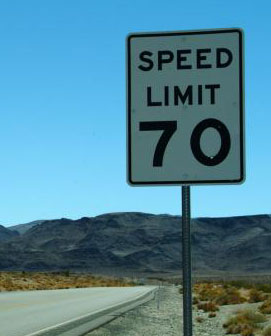Bad logic: speed limits
Opposition to speed limits divides an audience. Most immediately shut down to anything you have to say and call you crazy, and the others listen because they’re annoyed with speed limits but are still very skeptical.
 After all, speed limits are one of those things like food label warnings, fire exits, and health insurance that might save our lives. And because we want our lives to be saved, we want to make an absolute rule that all lives get saved the same way. Fear creates absolutes.
After all, speed limits are one of those things like food label warnings, fire exits, and health insurance that might save our lives. And because we want our lives to be saved, we want to make an absolute rule that all lives get saved the same way. Fear creates absolutes.
This is a type of broken reasoning where humans are both cause and effect of all that happens in their world. The ultimate goal, or effect, is to preserve ourselves. So we create rules to preserve all people as that guarantees us both preservation and the approval of others.
However, we’re unable to think beyond that moment to the effect of preserving everyone from themselves, and we’re also unable to think before that moment to the reason that different categories of activity — say, driving fast — have different results for different people. Some people are better drivers.
Looking past this confusion of cause, effect and self, we can see that speed limits have a number of problems:
- Preservation of idiots. Preserve idiots, and when they breed, you have more idiots.
- Trains us to break the law. If we’re able to drive competently, we can handle speeds above the average. This means you have smart people growing up learning that the law is for idiots, and needs to be broken, and cops need to be treated as an enemy or predator.
- Defines bad driving. We create a partial definition of bad driving by limiting our perception to quantitative, observable, legalistic reasoning like “he drove too fast” or “she went through a red light.” The only way you really know if someone is a bad driver is by observing them driving over a series of challenges.
- Doesn’t stop bad drivers. By making speeding a primary issue, you train law enforcement to stop speeders — not be wary of bad drivers, which is the larger problem.
At the very least, this is a fun thought experiment in which we can indulge: do speed limits achieve their goal? If not, what does? In considering our solutions, what prior and posterior factors are we missing — maybe that busting speeders causes problems, and considering “speeders = bad drivers” as an implicit equation warps our thinking?
And if you get through all that: in what others areas is this type of bad cause/effect reasoning applied, and maybe, how we can liberate ourselves from it.









